Self-Exploration: Applying Adult Learning Principles in Practice
VerifiedAdded on 2023/04/24
|7
|1714
|277
Essay
AI Summary
This essay delves into the principles of adult learning through a personal lens, examining a significant learning moment in the author's life. It explores the concepts of formal, informal, and incidental learning, relating them to the author's experiences navigating cultural differences in the workplace. The essay also touches upon Malcolm Knowles' adult learning principles and Kolb's learning styles, connecting them to the author's reflective practice. Ultimately, the author concludes that reflecting on personal experiences is crucial for recognizing and understanding the learning gained throughout life, impacting both professional and personal growth.
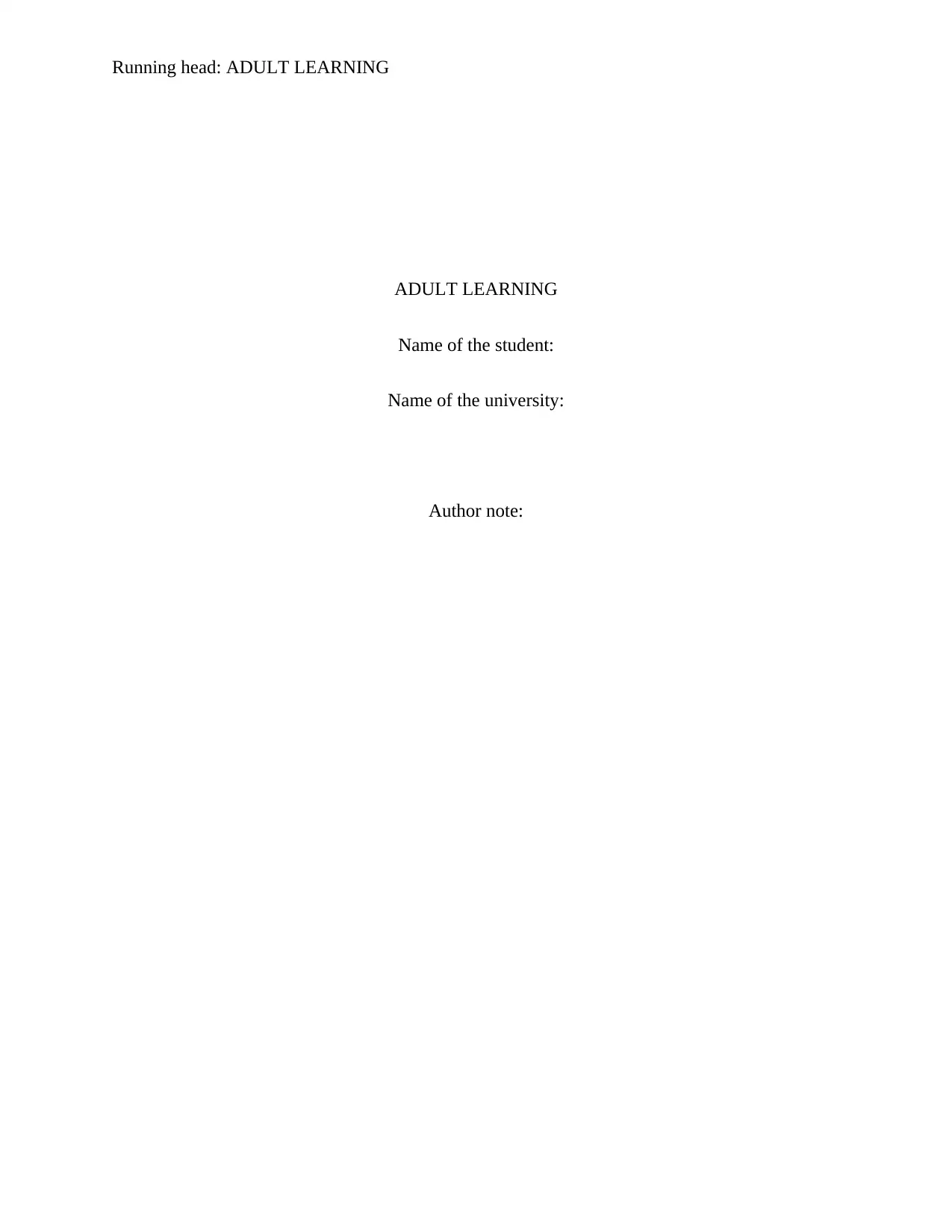
Running head: ADULT LEARNING
ADULT LEARNING
Name of the student:
Name of the university:
Author note:
ADULT LEARNING
Name of the student:
Name of the university:
Author note:
Paraphrase This Document
Need a fresh take? Get an instant paraphrase of this document with our AI Paraphraser
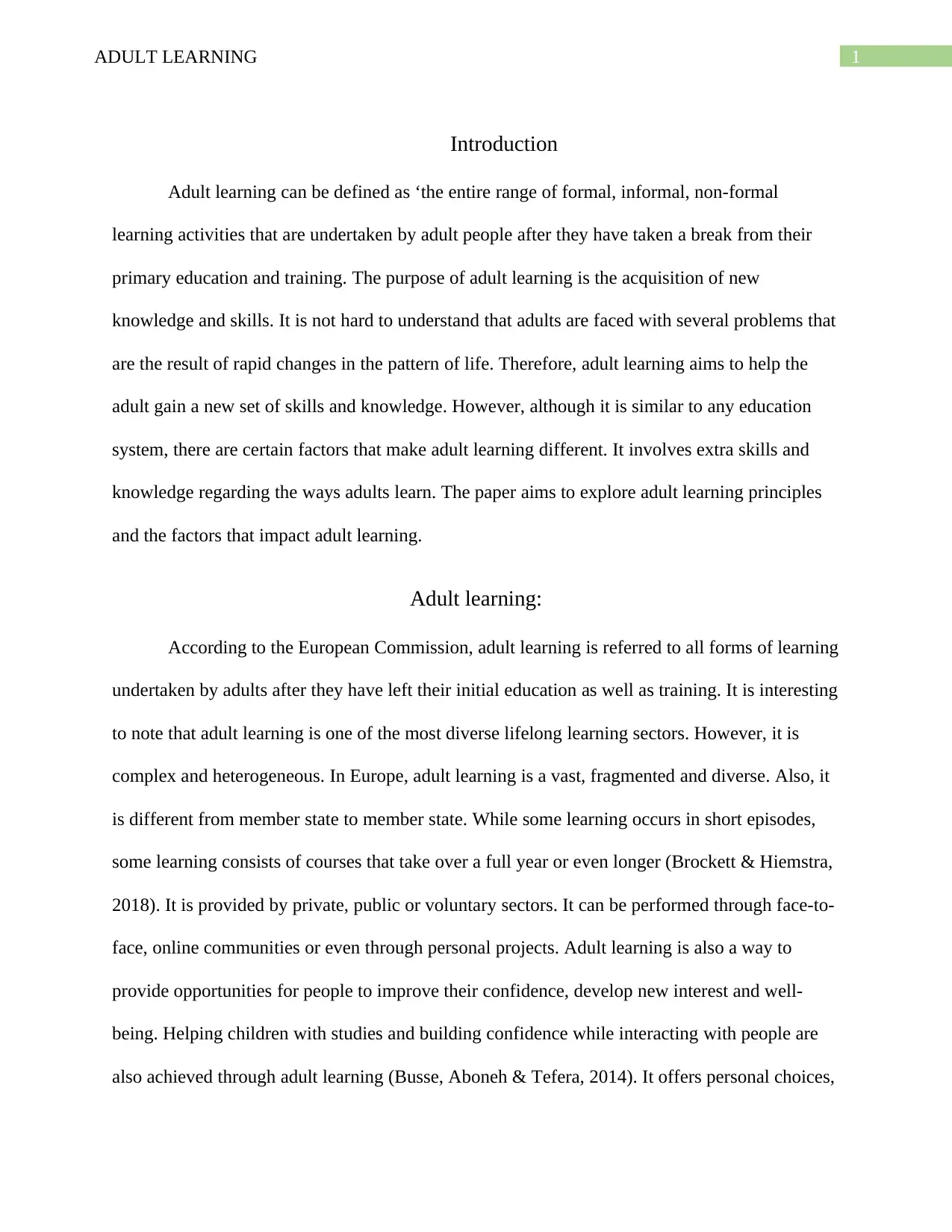
1ADULT LEARNING
Introduction
Adult learning can be defined as ‘the entire range of formal, informal, non-formal
learning activities that are undertaken by adult people after they have taken a break from their
primary education and training. The purpose of adult learning is the acquisition of new
knowledge and skills. It is not hard to understand that adults are faced with several problems that
are the result of rapid changes in the pattern of life. Therefore, adult learning aims to help the
adult gain a new set of skills and knowledge. However, although it is similar to any education
system, there are certain factors that make adult learning different. It involves extra skills and
knowledge regarding the ways adults learn. The paper aims to explore adult learning principles
and the factors that impact adult learning.
Adult learning:
According to the European Commission, adult learning is referred to all forms of learning
undertaken by adults after they have left their initial education as well as training. It is interesting
to note that adult learning is one of the most diverse lifelong learning sectors. However, it is
complex and heterogeneous. In Europe, adult learning is a vast, fragmented and diverse. Also, it
is different from member state to member state. While some learning occurs in short episodes,
some learning consists of courses that take over a full year or even longer (Brockett & Hiemstra,
2018). It is provided by private, public or voluntary sectors. It can be performed through face-to-
face, online communities or even through personal projects. Adult learning is also a way to
provide opportunities for people to improve their confidence, develop new interest and well-
being. Helping children with studies and building confidence while interacting with people are
also achieved through adult learning (Busse, Aboneh & Tefera, 2014). It offers personal choices,
Introduction
Adult learning can be defined as ‘the entire range of formal, informal, non-formal
learning activities that are undertaken by adult people after they have taken a break from their
primary education and training. The purpose of adult learning is the acquisition of new
knowledge and skills. It is not hard to understand that adults are faced with several problems that
are the result of rapid changes in the pattern of life. Therefore, adult learning aims to help the
adult gain a new set of skills and knowledge. However, although it is similar to any education
system, there are certain factors that make adult learning different. It involves extra skills and
knowledge regarding the ways adults learn. The paper aims to explore adult learning principles
and the factors that impact adult learning.
Adult learning:
According to the European Commission, adult learning is referred to all forms of learning
undertaken by adults after they have left their initial education as well as training. It is interesting
to note that adult learning is one of the most diverse lifelong learning sectors. However, it is
complex and heterogeneous. In Europe, adult learning is a vast, fragmented and diverse. Also, it
is different from member state to member state. While some learning occurs in short episodes,
some learning consists of courses that take over a full year or even longer (Brockett & Hiemstra,
2018). It is provided by private, public or voluntary sectors. It can be performed through face-to-
face, online communities or even through personal projects. Adult learning is also a way to
provide opportunities for people to improve their confidence, develop new interest and well-
being. Helping children with studies and building confidence while interacting with people are
also achieved through adult learning (Busse, Aboneh & Tefera, 2014). It offers personal choices,
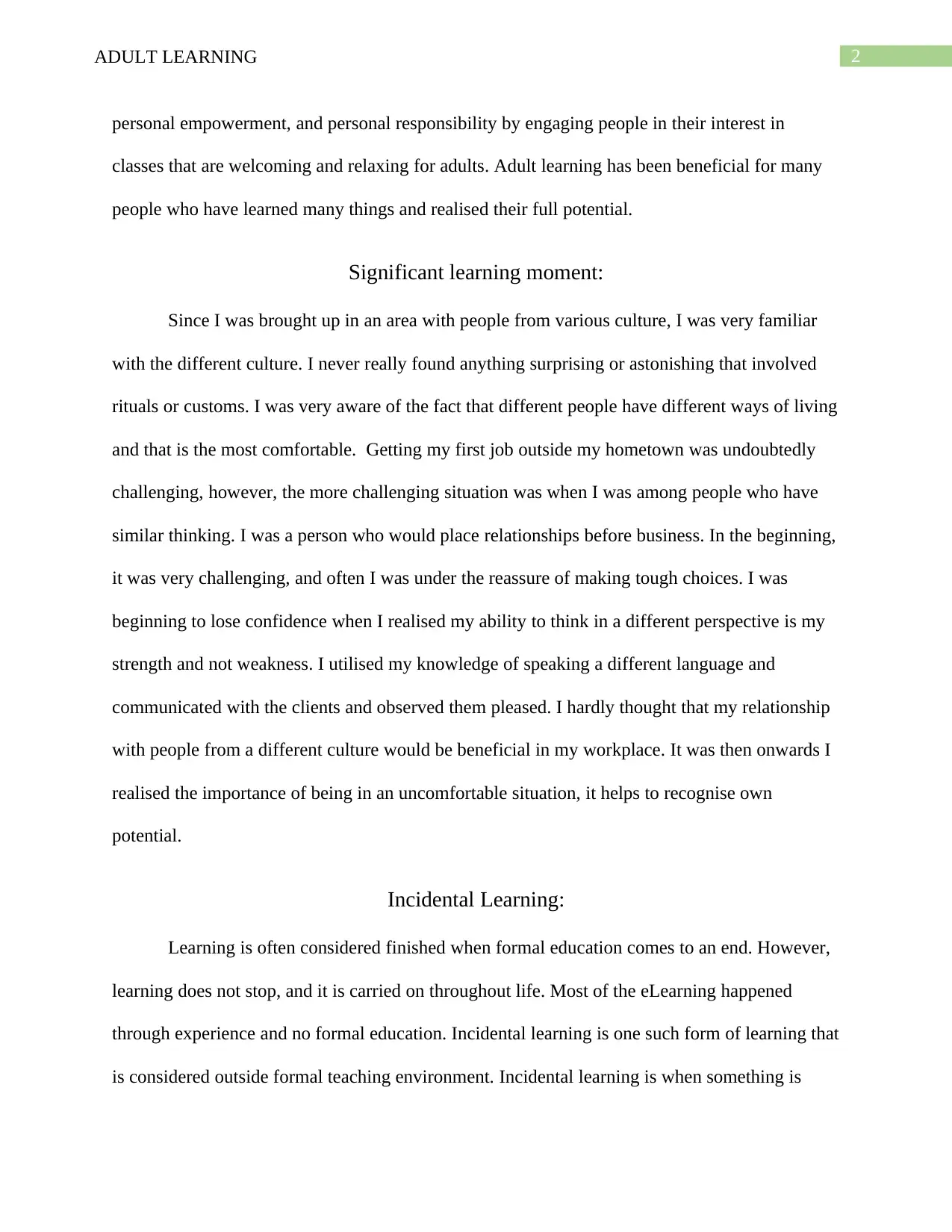
2ADULT LEARNING
personal empowerment, and personal responsibility by engaging people in their interest in
classes that are welcoming and relaxing for adults. Adult learning has been beneficial for many
people who have learned many things and realised their full potential.
Significant learning moment:
Since I was brought up in an area with people from various culture, I was very familiar
with the different culture. I never really found anything surprising or astonishing that involved
rituals or customs. I was very aware of the fact that different people have different ways of living
and that is the most comfortable. Getting my first job outside my hometown was undoubtedly
challenging, however, the more challenging situation was when I was among people who have
similar thinking. I was a person who would place relationships before business. In the beginning,
it was very challenging, and often I was under the reassure of making tough choices. I was
beginning to lose confidence when I realised my ability to think in a different perspective is my
strength and not weakness. I utilised my knowledge of speaking a different language and
communicated with the clients and observed them pleased. I hardly thought that my relationship
with people from a different culture would be beneficial in my workplace. It was then onwards I
realised the importance of being in an uncomfortable situation, it helps to recognise own
potential.
Incidental Learning:
Learning is often considered finished when formal education comes to an end. However,
learning does not stop, and it is carried on throughout life. Most of the eLearning happened
through experience and no formal education. Incidental learning is one such form of learning that
is considered outside formal teaching environment. Incidental learning is when something is
personal empowerment, and personal responsibility by engaging people in their interest in
classes that are welcoming and relaxing for adults. Adult learning has been beneficial for many
people who have learned many things and realised their full potential.
Significant learning moment:
Since I was brought up in an area with people from various culture, I was very familiar
with the different culture. I never really found anything surprising or astonishing that involved
rituals or customs. I was very aware of the fact that different people have different ways of living
and that is the most comfortable. Getting my first job outside my hometown was undoubtedly
challenging, however, the more challenging situation was when I was among people who have
similar thinking. I was a person who would place relationships before business. In the beginning,
it was very challenging, and often I was under the reassure of making tough choices. I was
beginning to lose confidence when I realised my ability to think in a different perspective is my
strength and not weakness. I utilised my knowledge of speaking a different language and
communicated with the clients and observed them pleased. I hardly thought that my relationship
with people from a different culture would be beneficial in my workplace. It was then onwards I
realised the importance of being in an uncomfortable situation, it helps to recognise own
potential.
Incidental Learning:
Learning is often considered finished when formal education comes to an end. However,
learning does not stop, and it is carried on throughout life. Most of the eLearning happened
through experience and no formal education. Incidental learning is one such form of learning that
is considered outside formal teaching environment. Incidental learning is when something is
⊘ This is a preview!⊘
Do you want full access?
Subscribe today to unlock all pages.

Trusted by 1+ million students worldwide
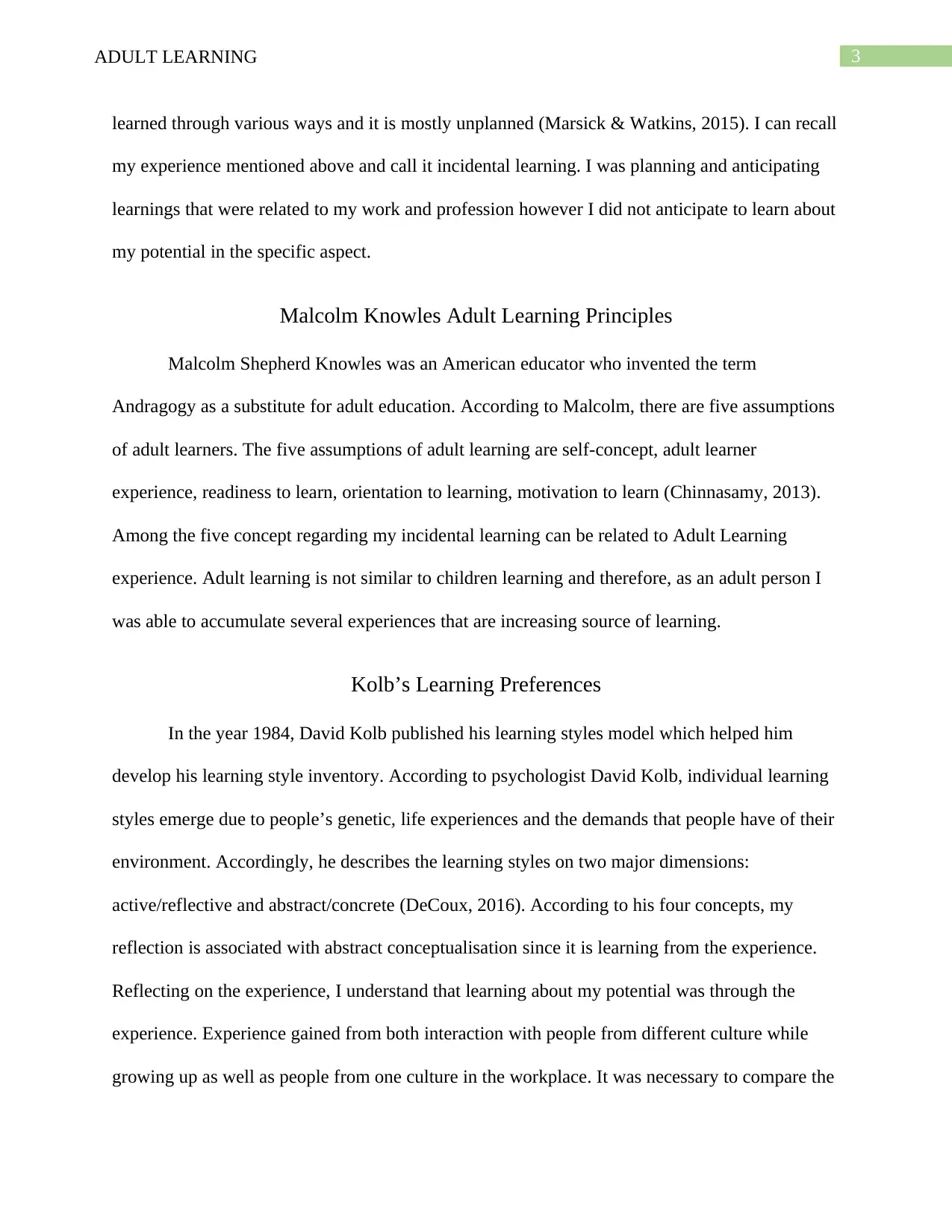
3ADULT LEARNING
learned through various ways and it is mostly unplanned (Marsick & Watkins, 2015). I can recall
my experience mentioned above and call it incidental learning. I was planning and anticipating
learnings that were related to my work and profession however I did not anticipate to learn about
my potential in the specific aspect.
Malcolm Knowles Adult Learning Principles
Malcolm Shepherd Knowles was an American educator who invented the term
Andragogy as a substitute for adult education. According to Malcolm, there are five assumptions
of adult learners. The five assumptions of adult learning are self-concept, adult learner
experience, readiness to learn, orientation to learning, motivation to learn (Chinnasamy, 2013).
Among the five concept regarding my incidental learning can be related to Adult Learning
experience. Adult learning is not similar to children learning and therefore, as an adult person I
was able to accumulate several experiences that are increasing source of learning.
Kolb’s Learning Preferences
In the year 1984, David Kolb published his learning styles model which helped him
develop his learning style inventory. According to psychologist David Kolb, individual learning
styles emerge due to people’s genetic, life experiences and the demands that people have of their
environment. Accordingly, he describes the learning styles on two major dimensions:
active/reflective and abstract/concrete (DeCoux, 2016). According to his four concepts, my
reflection is associated with abstract conceptualisation since it is learning from the experience.
Reflecting on the experience, I understand that learning about my potential was through the
experience. Experience gained from both interaction with people from different culture while
growing up as well as people from one culture in the workplace. It was necessary to compare the
learned through various ways and it is mostly unplanned (Marsick & Watkins, 2015). I can recall
my experience mentioned above and call it incidental learning. I was planning and anticipating
learnings that were related to my work and profession however I did not anticipate to learn about
my potential in the specific aspect.
Malcolm Knowles Adult Learning Principles
Malcolm Shepherd Knowles was an American educator who invented the term
Andragogy as a substitute for adult education. According to Malcolm, there are five assumptions
of adult learners. The five assumptions of adult learning are self-concept, adult learner
experience, readiness to learn, orientation to learning, motivation to learn (Chinnasamy, 2013).
Among the five concept regarding my incidental learning can be related to Adult Learning
experience. Adult learning is not similar to children learning and therefore, as an adult person I
was able to accumulate several experiences that are increasing source of learning.
Kolb’s Learning Preferences
In the year 1984, David Kolb published his learning styles model which helped him
develop his learning style inventory. According to psychologist David Kolb, individual learning
styles emerge due to people’s genetic, life experiences and the demands that people have of their
environment. Accordingly, he describes the learning styles on two major dimensions:
active/reflective and abstract/concrete (DeCoux, 2016). According to his four concepts, my
reflection is associated with abstract conceptualisation since it is learning from the experience.
Reflecting on the experience, I understand that learning about my potential was through the
experience. Experience gained from both interaction with people from different culture while
growing up as well as people from one culture in the workplace. It was necessary to compare the
Paraphrase This Document
Need a fresh take? Get an instant paraphrase of this document with our AI Paraphraser
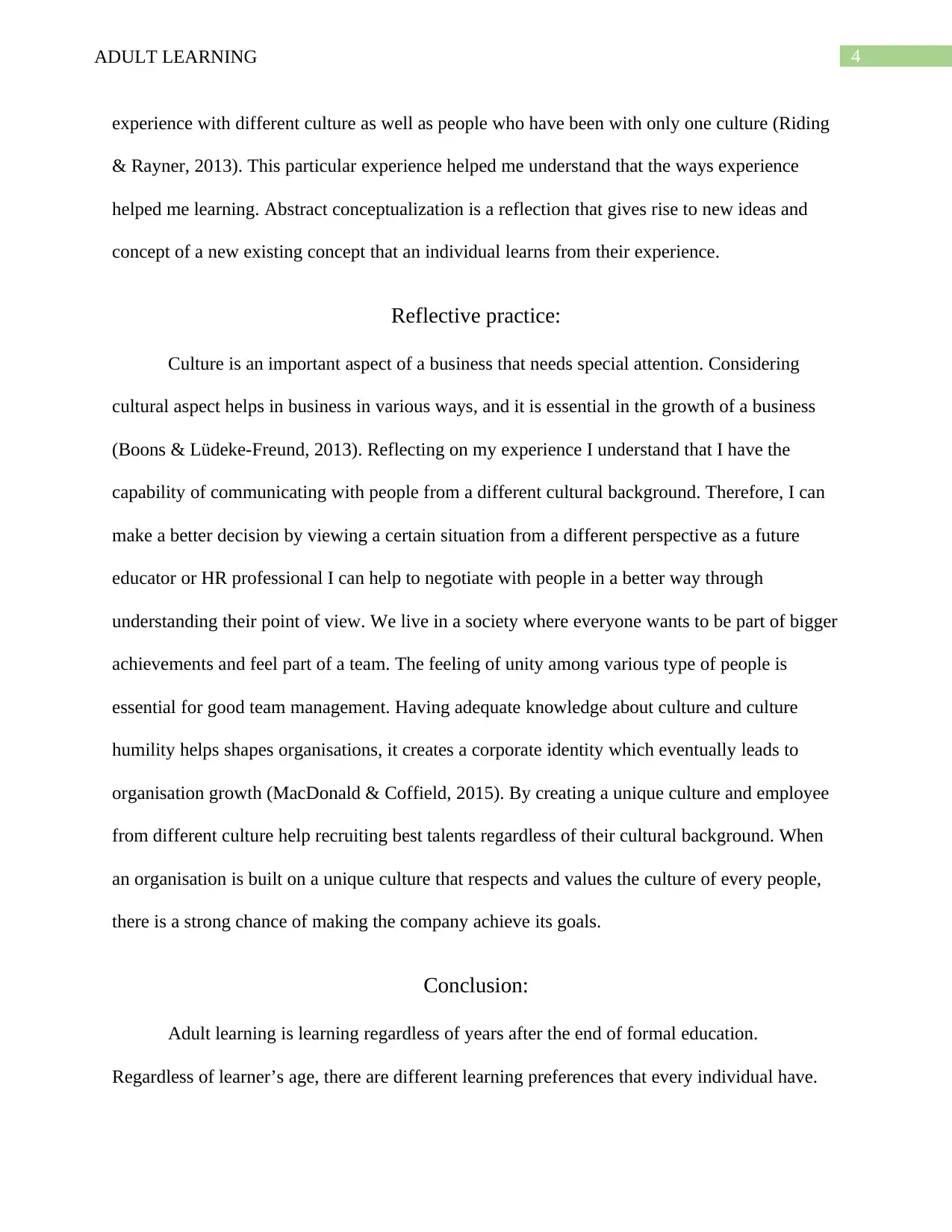
4ADULT LEARNING
experience with different culture as well as people who have been with only one culture (Riding
& Rayner, 2013). This particular experience helped me understand that the ways experience
helped me learning. Abstract conceptualization is a reflection that gives rise to new ideas and
concept of a new existing concept that an individual learns from their experience.
Reflective practice:
Culture is an important aspect of a business that needs special attention. Considering
cultural aspect helps in business in various ways, and it is essential in the growth of a business
(Boons & Lüdeke-Freund, 2013). Reflecting on my experience I understand that I have the
capability of communicating with people from a different cultural background. Therefore, I can
make a better decision by viewing a certain situation from a different perspective as a future
educator or HR professional I can help to negotiate with people in a better way through
understanding their point of view. We live in a society where everyone wants to be part of bigger
achievements and feel part of a team. The feeling of unity among various type of people is
essential for good team management. Having adequate knowledge about culture and culture
humility helps shapes organisations, it creates a corporate identity which eventually leads to
organisation growth (MacDonald & Coffield, 2015). By creating a unique culture and employee
from different culture help recruiting best talents regardless of their cultural background. When
an organisation is built on a unique culture that respects and values the culture of every people,
there is a strong chance of making the company achieve its goals.
Conclusion:
Adult learning is learning regardless of years after the end of formal education.
Regardless of learner’s age, there are different learning preferences that every individual have.
experience with different culture as well as people who have been with only one culture (Riding
& Rayner, 2013). This particular experience helped me understand that the ways experience
helped me learning. Abstract conceptualization is a reflection that gives rise to new ideas and
concept of a new existing concept that an individual learns from their experience.
Reflective practice:
Culture is an important aspect of a business that needs special attention. Considering
cultural aspect helps in business in various ways, and it is essential in the growth of a business
(Boons & Lüdeke-Freund, 2013). Reflecting on my experience I understand that I have the
capability of communicating with people from a different cultural background. Therefore, I can
make a better decision by viewing a certain situation from a different perspective as a future
educator or HR professional I can help to negotiate with people in a better way through
understanding their point of view. We live in a society where everyone wants to be part of bigger
achievements and feel part of a team. The feeling of unity among various type of people is
essential for good team management. Having adequate knowledge about culture and culture
humility helps shapes organisations, it creates a corporate identity which eventually leads to
organisation growth (MacDonald & Coffield, 2015). By creating a unique culture and employee
from different culture help recruiting best talents regardless of their cultural background. When
an organisation is built on a unique culture that respects and values the culture of every people,
there is a strong chance of making the company achieve its goals.
Conclusion:
Adult learning is learning regardless of years after the end of formal education.
Regardless of learner’s age, there are different learning preferences that every individual have.
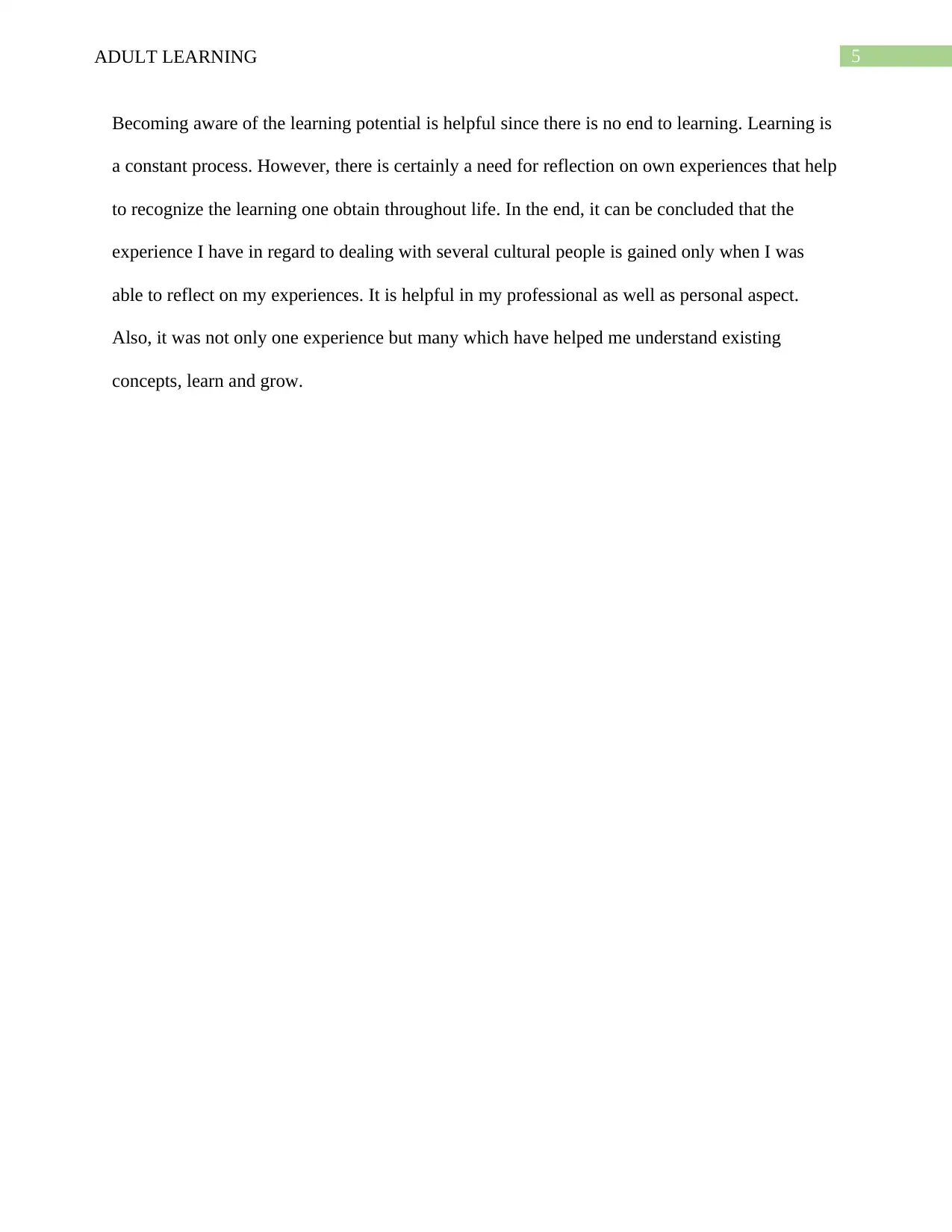
5ADULT LEARNING
Becoming aware of the learning potential is helpful since there is no end to learning. Learning is
a constant process. However, there is certainly a need for reflection on own experiences that help
to recognize the learning one obtain throughout life. In the end, it can be concluded that the
experience I have in regard to dealing with several cultural people is gained only when I was
able to reflect on my experiences. It is helpful in my professional as well as personal aspect.
Also, it was not only one experience but many which have helped me understand existing
concepts, learn and grow.
Becoming aware of the learning potential is helpful since there is no end to learning. Learning is
a constant process. However, there is certainly a need for reflection on own experiences that help
to recognize the learning one obtain throughout life. In the end, it can be concluded that the
experience I have in regard to dealing with several cultural people is gained only when I was
able to reflect on my experiences. It is helpful in my professional as well as personal aspect.
Also, it was not only one experience but many which have helped me understand existing
concepts, learn and grow.
⊘ This is a preview!⊘
Do you want full access?
Subscribe today to unlock all pages.

Trusted by 1+ million students worldwide
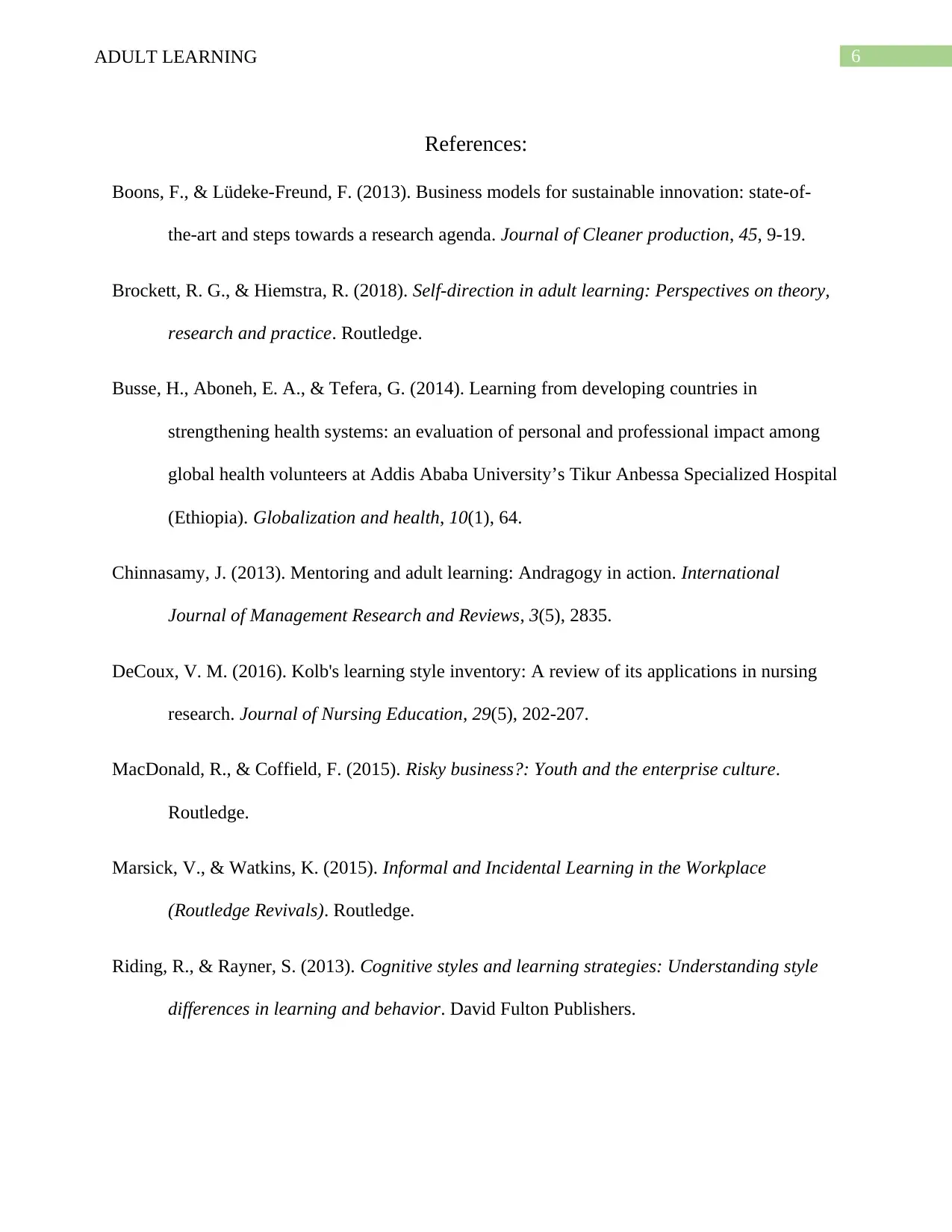
6ADULT LEARNING
References:
Boons, F., & Lüdeke-Freund, F. (2013). Business models for sustainable innovation: state-of-
the-art and steps towards a research agenda. Journal of Cleaner production, 45, 9-19.
Brockett, R. G., & Hiemstra, R. (2018). Self-direction in adult learning: Perspectives on theory,
research and practice. Routledge.
Busse, H., Aboneh, E. A., & Tefera, G. (2014). Learning from developing countries in
strengthening health systems: an evaluation of personal and professional impact among
global health volunteers at Addis Ababa University’s Tikur Anbessa Specialized Hospital
(Ethiopia). Globalization and health, 10(1), 64.
Chinnasamy, J. (2013). Mentoring and adult learning: Andragogy in action. International
Journal of Management Research and Reviews, 3(5), 2835.
DeCoux, V. M. (2016). Kolb's learning style inventory: A review of its applications in nursing
research. Journal of Nursing Education, 29(5), 202-207.
MacDonald, R., & Coffield, F. (2015). Risky business?: Youth and the enterprise culture.
Routledge.
Marsick, V., & Watkins, K. (2015). Informal and Incidental Learning in the Workplace
(Routledge Revivals). Routledge.
Riding, R., & Rayner, S. (2013). Cognitive styles and learning strategies: Understanding style
differences in learning and behavior. David Fulton Publishers.
References:
Boons, F., & Lüdeke-Freund, F. (2013). Business models for sustainable innovation: state-of-
the-art and steps towards a research agenda. Journal of Cleaner production, 45, 9-19.
Brockett, R. G., & Hiemstra, R. (2018). Self-direction in adult learning: Perspectives on theory,
research and practice. Routledge.
Busse, H., Aboneh, E. A., & Tefera, G. (2014). Learning from developing countries in
strengthening health systems: an evaluation of personal and professional impact among
global health volunteers at Addis Ababa University’s Tikur Anbessa Specialized Hospital
(Ethiopia). Globalization and health, 10(1), 64.
Chinnasamy, J. (2013). Mentoring and adult learning: Andragogy in action. International
Journal of Management Research and Reviews, 3(5), 2835.
DeCoux, V. M. (2016). Kolb's learning style inventory: A review of its applications in nursing
research. Journal of Nursing Education, 29(5), 202-207.
MacDonald, R., & Coffield, F. (2015). Risky business?: Youth and the enterprise culture.
Routledge.
Marsick, V., & Watkins, K. (2015). Informal and Incidental Learning in the Workplace
(Routledge Revivals). Routledge.
Riding, R., & Rayner, S. (2013). Cognitive styles and learning strategies: Understanding style
differences in learning and behavior. David Fulton Publishers.
1 out of 7
Related Documents
Your All-in-One AI-Powered Toolkit for Academic Success.
+13062052269
info@desklib.com
Available 24*7 on WhatsApp / Email
![[object Object]](/_next/static/media/star-bottom.7253800d.svg)
Unlock your academic potential
Copyright © 2020–2026 A2Z Services. All Rights Reserved. Developed and managed by ZUCOL.



